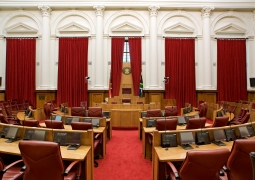
Mr Dennis Ryder, who represents the Gauteng Province in the NCOP, said the cost of corruption to the economy is a serious problem. He said: “We should ask ourselves, why are we faced with these hard choices today? The money we should now be using to curb the spread of the pandemic has been stolen or spent on luxury cars and lavish parties.”
He also condemned the negative impact of lockdown regulations on the economy. “Due to unnecessary lockdown regulations, tax revenue streams have been severely affected and taken away by these regulations. This, while the demand for expenditure, state-owned enterprises bailouts, public servant salaries and social grants on this thriving economy can no longer be sustained,” he added.
Mr Ryder appealed to the government to act harshly to stop the stealing of public funds through fraud and corruption, and must make sure that every cent is accounted for to ensure that those found guilty face the consequences; and that they don’t get redeployed elsewhere, but are sent to jail.
The KwaZulu-Natal Government’s MEC for Finance, Mr Ravi Pillay, said his province fights against corruption and advocates for accountability in dealing with public funds related to Covid-19. He said: “We have recently released two reports on fraud and corruption associated with Covid-19 PPEs tenders which were concluded in eight weeks, and those implicated have appeared before the court.”
He promised the NCOP that the consequence management his provincial government is following reflects their commitment to fighting corruption and shows how their actions on the ground are in proportion to their words.
Ms Mmabatho Makause said the much-talked about adjusted budget is an imaginary budget. According to her, the simple fact that cannot be disputed is that there has never been a R500 billion stimulus to the economy through the adjustment of the budget.
She said: “The Covid-19 adjusted budget is an imaginary fund that never existed. This R500 billion funds for the Adjustment Appropriation Bill are not a new budget appropriation, its funds taken from other projects.
Referring to the massive budget cuts from other projects to fund government’s response to Covid-19, she claimed that there is now a moral bankruptcy happening in front of people’s eyes. “We have witnessed the budget cuts of other equally important projects of the state because we follow instructions from global financial institutions to cut expenditure on social programmes that benefit the poor and the destitute.”
Apart from that, she could not comprehend the R155 million cut on vocational training, the R4 billion taxi recapitalisation and road projects, a move which “will ensure that our people, most of whom use taxis to work, will be subjected to unroadworthy taxis and poor roads”.
Mr Willem Aucamp, who represents the Northern Cape Province in the NCOP, pointed out that the current rising debt is a result of years of financial mismanagement. He said: “The R7.2 billion debt we have incurred is money that could feed half of the South African population which is facing hunger.”
The Industrial Age may not be over, but the economy of the future is digital, he said. “South Africa must find its niche in this new environment, there can be no return to the normal. And we must ensure that companies that employ people are not allowed to collapse.”
Ms Stella Mondlane, who represents the South African Local Government Association (Salga), said Salga supports the Bill and its R11 billion injection for recognising local government’s role in responding to Covid-19.
Reacting to the Auditor-General’s (AG’s) recent report, she proclaimed that local government must embrace the principles of good governance, intensify accountability and investigate transgressions reported by the AG. She also contested that in the light of all these challenges, there is a need to expedite the review of the White Paper on the funding of local government.
In concluding the debate, Mr Mboweni told the NCOP that future generations will repay the debt because these loans are going to be paid in the future.
Regarding the management of the Covid-19 funds, he said “irrespective of political persuasion we must ensure that this budget reaches its stated objectives and commitments”.
He said the urgent task is to restart the economy. “We must ensure that jobs are protected, that new jobs are created and enterprises under economic distress are assisted.”
By Abel Mputing
31 July 2020

